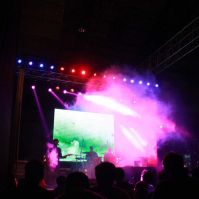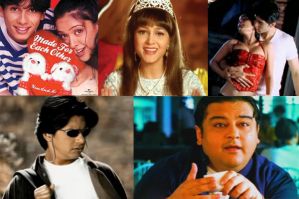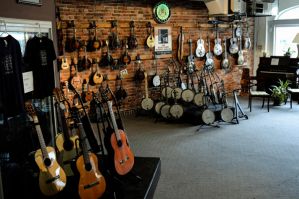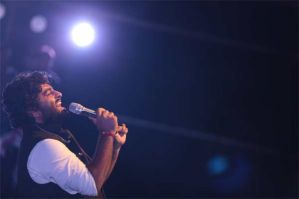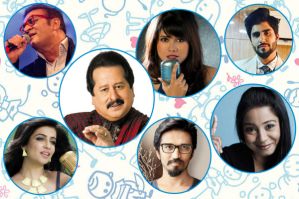Women musicians - a rare breed on an uphill journey

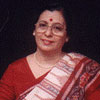
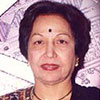


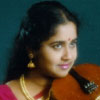
The music industry continues to be a male-dominated bastion in India, both in the classical and the film sectors.
Apart from women vocalists, the industry does not take kindly to women who try to prove their mettle on skills traditionally associated with men - be it tabla playing or composing tunes.
Nevertheless, a few intrepid women have persevered enough to break through the barriers and establish themselves, rough though the road may have been.
Gender bias
This phenomenon was not strange to Anuradha Pal, who combated every hurdle and is a well known tabla player today. For her, it has been a hard-won battle in a field traditionally dominated by men. Having performed with maestros like Pandit Jasraj, Hariprasad Chaurasia and Vishwamohan Bhatt, Zakhir Hussian however, her name today commands as much respect as any prominent male tabla player. Says Pal, "Women have been consciously kept away from the tabla on the pretext that they don't have the kind of stamina required for it. There is a lot of stigma attached when it comes to women playing tabla in the music world. According to me, it is the quality of work and not gender of the artist that is required to perform on stage."
Interestingly, Pal says that it is not only the men but also the women in the industry who discriminate. Remembering one such incident, she says, "It was during a music festival in Amritsar that a renowned female vocalist came and praised the way I played the tabla and later said that it is strange to see a woman play a tabla with the vigour always associated with men!"Another tabla maestro who has scaled glorious heights as a musician is Dr Aban Mistry. As the first woman tabla player in the country Mistry has been listed in the Limca Book of Records. Recollecting her days of constant struggle, the 69-year-old instrumentalist says, "Back in the 1960s when I used to perform, people, especially men, came to my concerts to see me rather than listen to me. Men musicians did not like the concept of a woman performing better or even on par with them on the same stage and it would hurt their ego. Even women singers refused to take me on as an accompanist because they would not trust me. No one took me seriously and I had to struggle to prove that I was a good musician."
Denied opportunities
One of the drawbacks of being a woman tabla player was not being given a chance to prove her talent, believes Mistry. "Since not many male vocalists and instrumentalists were willing to give a female tabla player the opportunity to perform with them, I thought of performing solo concerts. But again, not many organisers were willing to take the risk of conducting a musical concert featuring women as they feared not many listeners would turn up!"
Today, with a voice oozing determination, she says, "I feel great when I look back at what I have achieved in spite of the fact that things didn't come easy my way. I would advise any female who wants to take up the tabla that the path to success is not easy and hurdles are guaranteed. She should be determined enough to constantly prove herself in this male dominated scenario."
Pal reminisces that well known musicians too would not allow her to accompany them on the fast tracks. "Being a woman, I was not supposed to have the energy to sustain the tempo! Even if given a chance to compete or rather perform on par with them, the next time you would be denied the opportunity to play with him."
"There are many excuses like, the tabla is not meant for gentle hands and it requires a lot of commitment which a woman cannot assure after marriage and so on¦ the excuses were many, but the encouragements only a few. If we look at the music industry today, all the top positions in vocals as well as instrumentals are occupied by men. Women are still not in the picture and the number of concerts performed by women are far fewer than those by men. So this gives us a clear picture of the whole issue that women are still not on par and have not entered the mainstream," she maintains. To give a chance to women instrumentalists, Anuradha has started her own band- Stree Shakti comprising women percussionists in 1996.
Getting a guru to sharpen your skills is also a dilemma that female artistes have to go through, especially when learning instruments like the sarod or tabla. Luckily for Mistry, Ustad Amir Hussain Khan asked her to become his student after hearing her perform at a concert at the age of 14, just like Bagheshwari Qamar, a shehnai player studied under the tutelage of Ustad Bismillah Khan. Music is central to Bollywood, but though there are many female vocalists in this industry, there are hardly any female composers around.
One name that stands out in this industry is veteran composer Usha Khanna, who broke the gender bias back in the 1950s and made a glorious debut as a composer with Dil Deke Dekho in 1959. She continued to groove listeners with popular films like Souten, Hum Hindustani, Kaaran, Aag and many more, but has had no successor worth the name. Speaking about the dearth of women music directors in Bollywood, music director and singer Shibani Kashyap says, "I guess it is the fear of not getting the opportunity to playback in the future for other music directors that deters females from entering this field. But I would say that the singers must shatter these stereotypical notions and come out of their shell. They should get rid of fear and open up for new opportunities."
Breaking this myth that composing is a man's cup of tea, Kashyap composed for films like Zinda and has new projects like Woodstock Villa, Main Osama under her belt. Recalling her initial compositions in Bollywood, she says, "Initially, it was very disappointing because my due credits as a music composer were not given to me. I remember for the film 'Aisa bhi hota hai', I had composed and sung a hit song 'Sajana aa bhi ja' and when the music was launched I was given credits for being a singer and not the composer of the song. It was only after I was conferred with Sangeet awards for my album, Nazakat that the industry realised my potential as a composer and many projects like Zinda and Sunday came my way. Today, when I look back, it feels right to see what I have achieved in spite of the prevailing gender bias".
E Gayathri, a veena player, has not allowed the gender bias to affect her work or success. "I believe that whatever gender discriminations exist, they cannot deter my aim of achieving the best and it doesn't any more affect my spirit. Although there have been cases when famous mridangam players refused to accompany female artistes , I believe that not performing with them won't affect my success even a bit!"Violinist and vocalist Lalgudi Vijayalaxmi says, "Till the time I took up the violin, it was not very uncommon for women to play it and there were many senior female violinists. But the gender bias did exist and a male vocalist or instrumentalist preferred only a male violinist on the stage as accompanist. I missed out on quite a few opportunities to play with some of the leading names in the classical music scenario. However, now I think the winds of changes are flowing and many young broadminded male artistes are willing to perform with the female counterparts. The further changes are that the organisers seem to give equal importance to both the female and male artistes in the music industry today".
With determination to shatter the stereotypes and a passion to carve a niche for themselves, female instrumentalists of the new century are pushing all dimensions to prove themselves. All they want is to be judged for their talent and not gender!





